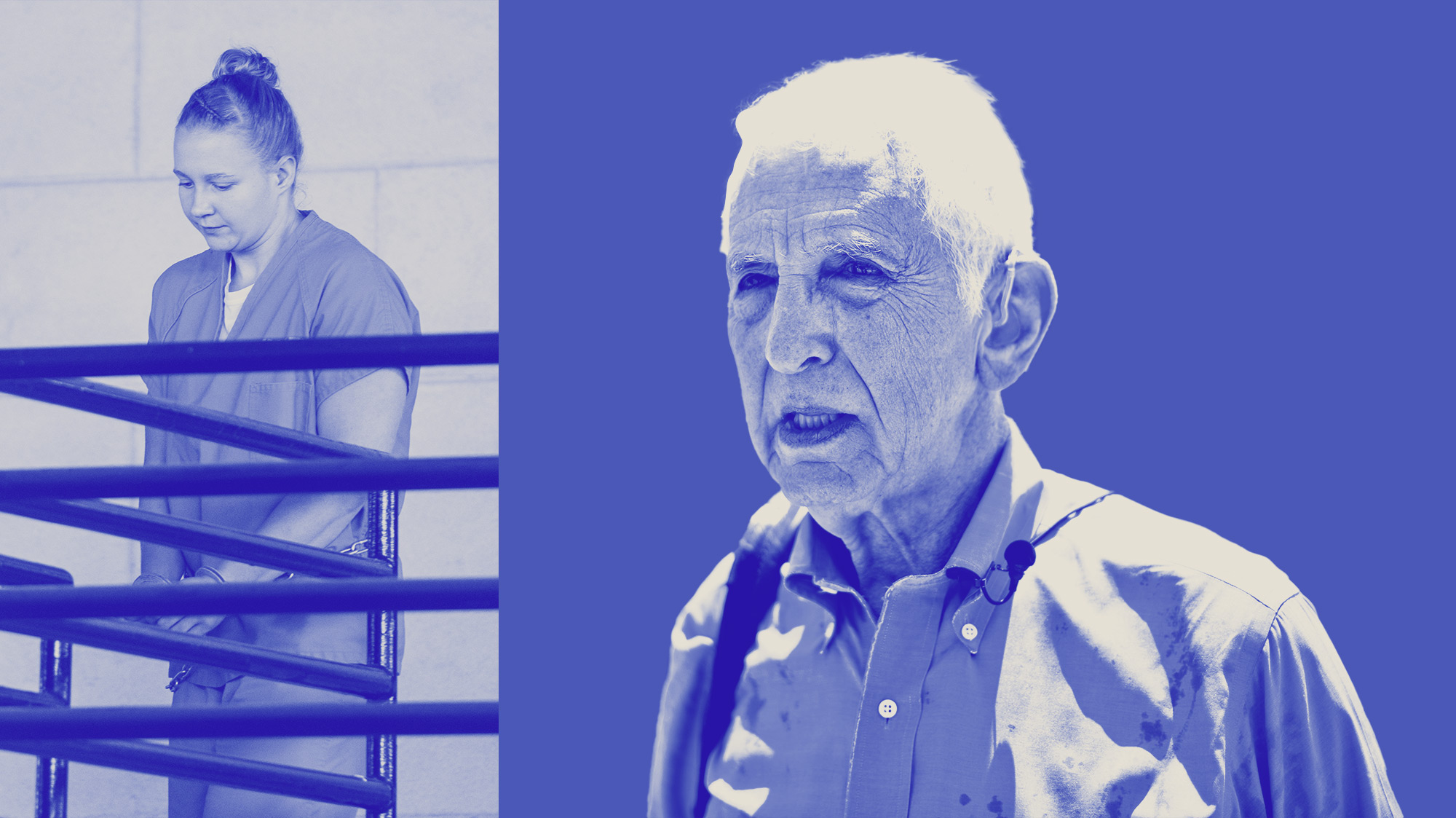Some of you have powerful memories of Daniel Ellsberg. You remember the incredible impact he had on the way Americans thought about the war in Vietnam when he leaked the Pentagon Papers back in 1971. My memory is different. It’s from just four weeks ago, when—in hospice care, knowing he had only weeks to live—he comforted a young whistleblower who’d come to conclude her act was pointless. You could have heard a pin drop, and I haven’t been able to stop thinking about that moment since I learned of Ellsberg’s death last Friday.
Ellsberg was a speaker at a conference, the Logan Symposium on Investigative Reporting, at the University of California, Berkeley. (You can watch the whole thing here.) He towered over the room on a giant Zoom screen, calling in from his home just a couple of miles away. On another screen was Reality Winner, who, as a twenty-something National Security Agency translator, leaked classified documents about Russian interference in the US election, and was sentenced to prison time for it. Now out and barred from traveling without the government’s permission, she sat in her living room in Corpus Christi, Texas, wearing a T-shirt that read “Grow Food, Love Hard,” and a weary expression.
It was clear from the outset that this was not the kind of panel where journalists congratulate each other for the great work they do. Ellsberg started it off noting, with a smile, that “I have yet to meet a whistleblower who has a good feeling about the newspaper they dealt with, or the reporter they dealt with.” Boom.
In Ellsberg’s case, the reporter he dealt with was Neil Sheehan, the New York Times reporter also famous for his history of the Vietnam War, A Bright Shining Lie. Sheehan and the Times won a Pulitzer for their coverage and for standing up to the Nixon administration, which went to court to stop them from publishing the documents. (My colleague David Corn remembers the episode, and how it changed his life, here.)
Ellsberg was not a beneficiary of the Times’ legal gumption. He faced charges under the Espionage Act by himself, though he eventually beat them. And it was eventually revealed that Sheehan had seriously betrayed Ellsberg’s confidence: Ellsberg told him he could read but not copy the documents, but let him have a key to his apartment. Sheehan used that to secretly copy the papers. As publication approached, Ellsberg pleaded with Sheehan to give him a bit of advance notice so he could take precautions. Sheehan never returned his calls.
None of this detracts from the impact of the Pentagon Papers, but it does reveal a more complicated story than what Ed Wasserman, who wrote about Ellsberg and Sheehan for Mother Jones, calls the Times’ “institutionally triumphalist perspective” about the story. At the panel in Berkeley, Ellsberg wanted the assembled journalists to reconsider how they think of whistleblowers.
“The assumption is, by virtually all reporters, that a crime has been committed…when truth is told to the public about government operations. That’s false. And reporters have lived comfortably with this delusion, with the willingness to use the law against someone who was giving information to the American public.”
Ellsberg never did go to prison: The courts rebuffed the Nixon administration’s charges against him for government misconduct. (Nixon had been so consumed with the affair, he had his “plumbers” break into Ellsberg’s therapist’s office—the start of the shenanigans that ended with Watergate.) Reality Winner was less fortunate. The Trump administration charged her, too, with violating the Espionage Act and she was sentenced to five years.
Right now, of course, the Espionage Act is in the headlines for a different reason: It’s the law under which Donald Trump faces charges for hiding classified documents at Mar-a-Lago. But stashing secrets in your gilded bathroom is a fairly unique offense. More often, the law is used to punish people seeking to inform the public. The Obama administration went after former New York Times reporter James Risen under the act, and the Biden administration is using it as it seeks to extradite WikiLeaks founder Julian Assange (in a case begun under Trump).
Which brings us to that pin-drop moment at the panel. The moderator asked both Ellsberg and Winner: Would you do it again? Ellsberg’s response: He had “very great regret”—but only for not sharing the documents sooner.
“I knew that the president was lying the country into a wrongful war,” he said. “I knew that perfectly well as did hundreds of thousands of others. I disobeyed my oath to defend the Constitution from all enemies foreign and domestic when we heard the president lying about these things…The president was violating his oath, I was violating mine, everyone else was. I’ve often said to others: Don’t do what I did. Don’t wait until thousands more have died.”
Then the moderator asked Winner the same question.
“I absolutely would not do it again,” she said. “One hundred percent, zero out of five stars.” An uncomfortable laugh rolled through the room. “It didn’t accomplish anything,” she added as the laughter died. “It didn’t have a positive effect on my country. It didn’t save America.”
Winner’s leak, if you recall (few people do), was about Russian interference in the 2016 election. She shared a report saying that Moscow had hacked at least one voting software contractor and tried to penetrate 100 county election systems. She was not allowed to defend herself by sharing why she’d done it—the judge ruled it irrelevant—but she’s always maintained that she was driven to leaking by the Trump administration’s deception. “The truth wasn’t true anymore,” she told 60 Minutes.
But in the headlines, that story quickly was overtaken by the hunt for her identity. “Pretty early in the news cycle [with any whistleblower] the attention is shifted from what the information is to who the source is,” Winner said. “Journalists love to cover crime, and everyone wants a piece of it. That’s where the real story gets lost. What the whistleblower was trying to bring to the public gets lost entirely.”
Five years on, it’s hard to disagree with her. Russian election interference is something Republicans talk about in the same breath as “hoax,” and Democrats barely talk about at all—even as security experts warn that Putin’s intelligence agencies likely will try to hack US voting systems again in 2024.
Winner was in prison when Covid hit. Tensions ran high on the inside, and lockdowns and fights were constant. She self-medicated, became addicted, and, when she was released, discovered that the world had moved on. “The people on the left who pretend to champion you, they really didn’t do anything for you,” she told the journalist Megan Stack. “The people in the center won’t say your name. And the people on the right still think you’re a terrorist.”
As the panel wound toward a close, Ellsberg addressed Winner directly. “Reality, I’ve never seen you before,” he said, “but I have been reading about your case and realizing that I should have been following it more. I apologize.”
“You should not have been charged with a crime. Especially not under the Espionage Act, when you were not allowed to answer the question of ‘Why did you do this?’ You did what I said earlier, what I would like people to do: You acted on what you saw in a timely way when it might still make a difference.”
The dying whistleblower, whose name is in every history book, giving comfort to the young leaker whom even her supporters barely remember. It was poignant and sweet, and as uncomfortable as it needed to be.
Journalists give each other a lot of awards—but often, it’s not just journalists who deserve the credit. We rely on so many people, from the top-secret leaker to the court clerk helping us find a document, to the survivor who shares their experience in an interview. Some risk life and limb, some simply take a leap of faith in trusting us to report their story accurately. Some are heroes, some are complicated, even unlikeable, figures, some are both. We—journalists and the public—owe them gratitude. But we also owe them something more: not forgetting them.
Right now, that means paying attention to the latest whistleblower charged with violations of the Espionage Act—WikiLeaks’ Assange. As many First Amendment experts have pointed out, what Assange is alleged to have done back in 2010, when he published the documents leaked by the intelligence analyst Chelsea Manning, is the same thing many journalists do, meaning that a conviction for him risks making newsgathering a crime.
Many people remember Assange better for his more recent leaks, the DNC emails hacked by Russia during the 2016 election campaign. (“I love WikiLeaks!” Donald Trump was fond of saying at the time.) He has also been accused of sexual assault by multiple women; Swedish prosecutors said these allegations were credible but ultimately dropped an investigation because, they said, witnesses’ memories had faded.
But that’s neither here nor there when it comes to these charges under the Espionage Act—a law passed, it’s worth remembering, during what historian (and Mother Jones co-founder) Adam Hochschild has called the “Trumpiest time in American history,” the years after the nation’s entry into World War I, when internal repression and censorship ran rampant. As Adam wrote in an article adapted from his book, American Midnight:
Despite its name, the new law had almost nothing to do with spies. Both opponents and supporters saw it for what it was: a club to smash progressive forces of all kinds. Sen. Lee Overman of North Carolina, for example, a plump, courtly Democrat who once helped filibuster an anti-lynching bill to death, declared that the Espionage Act was needed to prevent propaganda “urging Negroes to rise up against white people.” The act defined almost any opposition to the war as criminal. The penalties were draconian: “a fine of not more than $10,000 or imprisonment for not more than twenty years, or both.” What could send you to jail for 20 years? The list was so far-reaching that it was a prosecutor’s dream. At risk, for instance, was anyone who “shall willfully make or convey false reports or false statements with intent to interfere with the operation or success of the military or naval forces of the United States.”
The act has been amended since then, but it remains a powerful potential weapon against the press—and while the Supreme Court in the Pentagon Papers case ruled that the act cannot be used to stop publication of government secrets in advance, it never decided whether it can be used to go after journalists after publication. In fact, as the head of the ACLU’s Speech, Privacy, and Technology Project, Ben Wizner, has pointed out, the court “seemed to leave open that possibility” back in 1971.
Will the Republican majority on the Roberts court, several of them openly hostile to the press, finish the job if the Assange case lands on their docket? Will we soon live in a world where prison awaits not only whistleblowers like Reality Winner, but the journalists who publish their revelations, too? That’s the question Ellsberg, were he still here, would urge us not to ignore.











